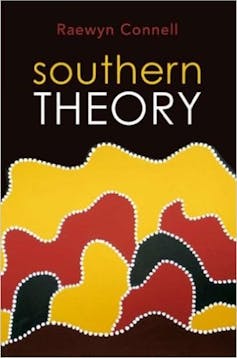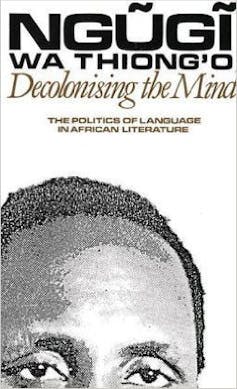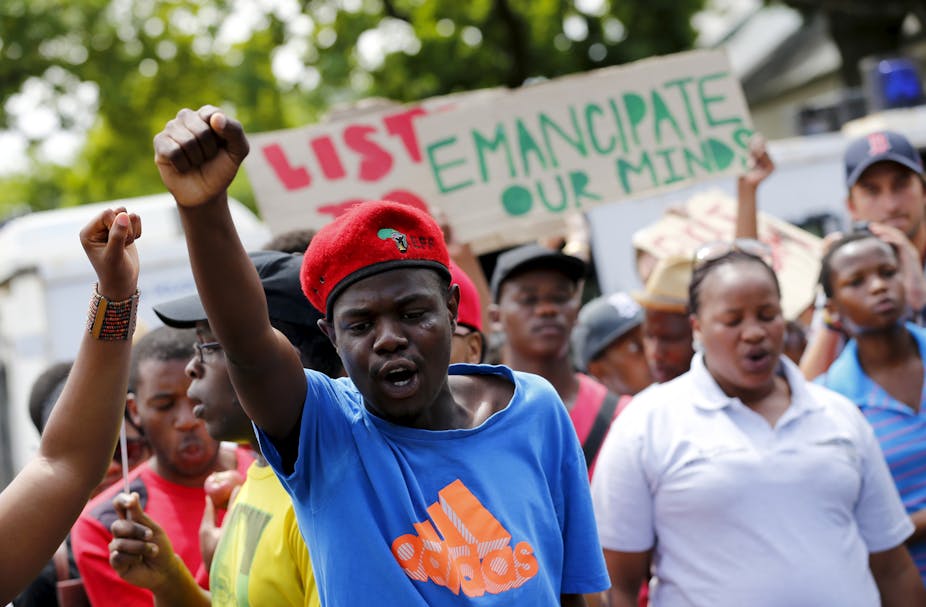In 2015 the decolonisation debate, epitomised by the #RhodesMustFall campaign, took centre stage in South Africa. The protests sought to remove all vestiges of racism and colonialism from university campuses. Below is my selection of the top five books that those interested in decolonisation might find helpful.
1) Theory from the South: Or, How Euro-America is Evolving toward Africa by Jean and John Comaroff. The book subverts the hallowed notion that knowledge comes from the global North, while the global South only provides the data.
The Comaroffs argue that it is the global South, particularly Africa, that is at the vanguard of global trends. They highlight themes relating to personhood, porous national boundaries and individual versus cultural rights.
They also reflect on democratic one-party states and offer critical perspectives on history as well as economic changes and political activism. In all, African perspectives offer innovative theoretical “scaffolding” to address global issues including xenophobia, economic downturn, democracy and HIV/AIDS.
2) Southern Theory: The Global Dynamics of Knowledge in Social Science by Raewyn Connell describes southern theory from places such as Australia, Latin America, and Asia. She argues that while theory from the global North is universally accepted, southern theory is labelled according to its geographical place of origin. It is thus made out to be applicable only in those spaces.

Connell also argues that the oligopolistic publishing industry relies on a few “celebrity” authors. Almost all of them come from the North and write in globally dominant languages. While this shows the cards stacked firmly against intellectuals from the so-called periphery, Connell asserts that such authors still have agency.
3) African Intellectuals and Decolonization is an anthology edited by Nicholas M. Creary. The essays explore themes relating to the struggle to decolonise African knowledge and the roles that African and Africanist intellectuals play in that struggle.
The first part unpicks representation and retrospection. It debunks commonly held perspectives that Africa’s decolonisation has failed or that it is all-encompassing. The second part explores perspectives on the struggle to decolonise African publics.
The third explores the decolonisation of knowledge. It reveals ways in which the tradition of Western metaphysical thought served to support colonialism and continues to impose Eurocentric values and norms onto African contexts.
Distinctly different African contexts are thus made to fit European models and are essentially misunderstood. The book’s abiding theme is the call from African scholars for African scholarship out of African contexts.
4) Decolonizing Methodologies: Research and Indigenous Peoples by Linda Tuhiwai Smith. This offers a passionate discussion of the ways in which Eurocentric research methodologies and theories have affected indigenous communities. These communities are often put under a microscope, not unlike flora and fauna.
The book maps the historical implications of research from the global North. The second part describes indigenous methodologies coming out of work done by indigenous researchers and their communities.
The last two chapters, added to the second edition, describe the implications of choosing this kind of research and what it means to link research to activist scholarship.

The book is written for indigenous researchers, but has also been well received by projects such as Rethinking Indigeneity which I’m working on.
The first book from the project, by Keyan Tomaselli, argues that the periphery is, in fact, the prism through which Northern methodological contradictions are best brought to the surface.
5) Then there is the great granddad from whence much of the above discussion derives: Ngugi’ wa Thiong’o’s Decolonising the Mind: The Politics of Language in African Literature.
Many of the works published on decolonisation originate from Ngugi’s idea of decolonising the African mind. Imperialism, he writes, has left its mark on the minds of the previously colonised. They personalise what was once far off and different and become detached from their immediate surrounds and culture.

Africans are groomed for such thinking from childhood in colonial and missionary schools. They see Africa, its languages, cultures, traditions and practices as backward, dark, evil and generally disdainful.
The continent is carved up in terms of imperial markers and its peoples are identified in terms of their colonisers. Tragically, African leaders in the postcolony wish for the return to colonial rule, with themselves as the new masters.
Ngugi argues that African intellectuals bear responsibility for popularising the decolonisation struggle. The liberation of African minds is the ultimate goal.
The decolonisation struggle continues. The protests it has sparked in recent times should motivate us to take stock of its progress.

